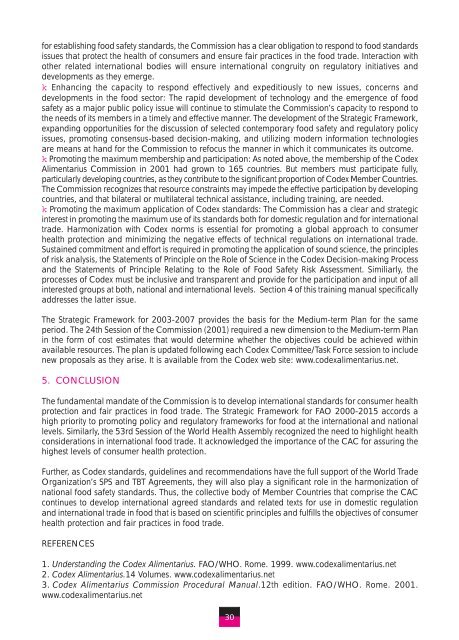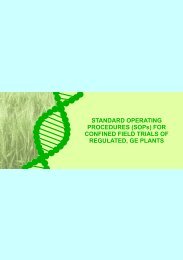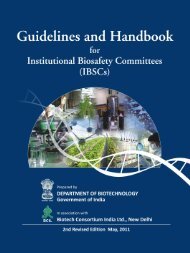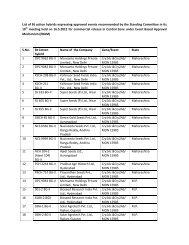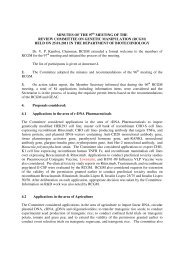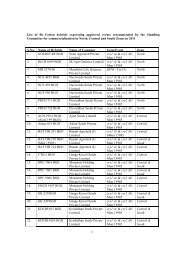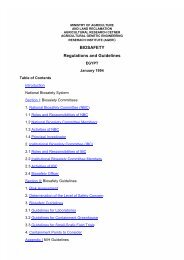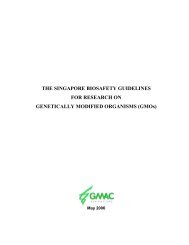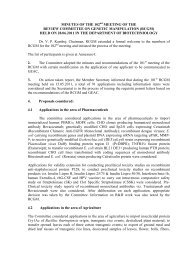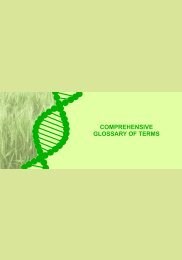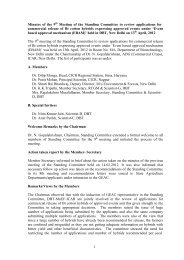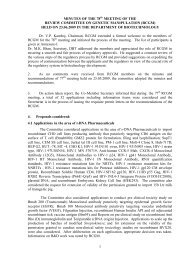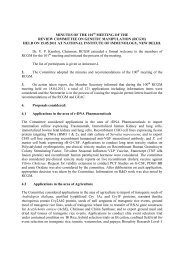THE USER'S MANUAL ON CODEX - Department of Biotechnology
THE USER'S MANUAL ON CODEX - Department of Biotechnology
THE USER'S MANUAL ON CODEX - Department of Biotechnology
Create successful ePaper yourself
Turn your PDF publications into a flip-book with our unique Google optimized e-Paper software.
for establishing food safety standards, the Commission has a clear obligation to respond to food standards<br />
issues that protect the health <strong>of</strong> consumers and ensure fair practices in the food trade. Interaction with<br />
other related international bodies will ensure international congruity on regulatory initiatives and<br />
developments as they emerge.<br />
k Enhancing the capacity to respond effectively and expeditiously to new issues, concerns and<br />
developments in the food sector: The rapid development <strong>of</strong> technology and the emergence <strong>of</strong> food<br />
safety as a major public policy issue will continue to stimulate the Commission’s capacity to respond to<br />
the needs <strong>of</strong> its members in a timely and effective manner. The development <strong>of</strong> the Strategic Framework,<br />
expanding opportunities for the discussion <strong>of</strong> selected contemporary food safety and regulatory policy<br />
issues, promoting consensus-based decision-making, and utilizing modern information technologies<br />
are means at hand for the Commission to refocus the manner in which it communicates its outcome.<br />
k Promoting the maximum membership and participation: As noted above, the membership <strong>of</strong> the Codex<br />
Alimentarius Commission in 2001 had grown to 165 countries. But members must participate fully,<br />
particularly developing countries, as they contribute to the significant proportion <strong>of</strong> Codex Member Countries.<br />
The Commission recognizes that resource constraints may impede the effective participation by developing<br />
countries, and that bilateral or multilateral technical assistance, including training, are needed.<br />
k Promoting the maximum application <strong>of</strong> Codex standards: The Commission has a clear and strategic<br />
interest in promoting the maximum use <strong>of</strong> its standards both for domestic regulation and for international<br />
trade. Harmonization with Codex norms is essential for promoting a global approach to consumer<br />
health protection and minimizing the negative effects <strong>of</strong> technical regulations on international trade.<br />
Sustained commitment and effort is required in promoting the application <strong>of</strong> sound science, the principles<br />
<strong>of</strong> risk analysis, the Statements <strong>of</strong> Principle on the Role <strong>of</strong> Science in the Codex Decision-making Process<br />
and the Statements <strong>of</strong> Principle Relating to the Role <strong>of</strong> Food Safety Risk Assessment. Similiarly, the<br />
processes <strong>of</strong> Codex must be inclusive and transparent and provide for the participation and input <strong>of</strong> all<br />
interested groups at both, national and international levels. Section 4 <strong>of</strong> this training manual specifically<br />
addresses the latter issue.<br />
The Strategic Framework for 2003-2007 provides the basis for the Medium-term Plan for the same<br />
period. The 24th Session <strong>of</strong> the Commission (2001) required a new dimension to the Medium-term Plan<br />
in the form <strong>of</strong> cost estimates that would determine whether the objectives could be achieved within<br />
available resources. The plan is updated following each Codex Committee/Task Force session to include<br />
new proposals as they arise. It is available from the Codex web site: www.codexalimentarius.net.<br />
5. C<strong>ON</strong>CLUSI<strong>ON</strong><br />
The fundamental mandate <strong>of</strong> the Commission is to develop international standards for consumer health<br />
protection and fair practices in food trade. The Strategic Framework for FAO 2000-2015 accords a<br />
high priority to promoting policy and regulatory frameworks for food at the international and national<br />
levels. Similarly, the 53rd Session <strong>of</strong> the World Health Assembly recognized the need to highlight health<br />
considerations in international food trade. It acknowledged the importance <strong>of</strong> the CAC for assuring the<br />
highest levels <strong>of</strong> consumer health protection.<br />
Further, as Codex standards, guidelines and recommendations have the full support <strong>of</strong> the World Trade<br />
Organization’s SPS and TBT Agreements, they will also play a significant role in the harmonization <strong>of</strong><br />
national food safety standards. Thus, the collective body <strong>of</strong> Member Countries that comprise the CAC<br />
continues to develop international agreed standards and related texts for use in domestic regulation<br />
and international trade in food that is based on scientific principles and fulfills the objectives <strong>of</strong> consumer<br />
health protection and fair practices in food trade.<br />
REFERENCES<br />
1. Understanding the Codex Alimentarius. FAO/WHO. Rome. 1999. www.codexalimentarius.net<br />
2. Codex Alimentarius.14 Volumes. www.codexalimentarius.net<br />
3. Codex Alimentarius Commission Procedural Manual.12th edition. FAO/WHO. Rome. 2001.<br />
www.codexalimentarius.net<br />
30


